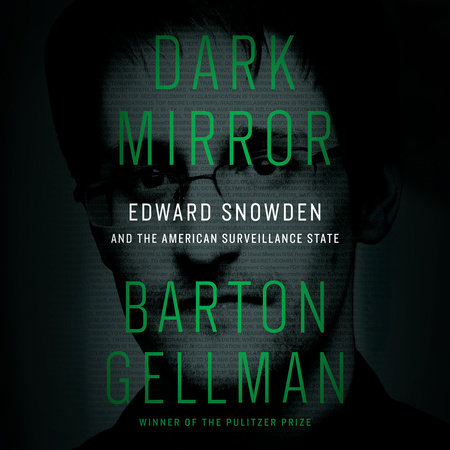I'm still trying to catch up on reviewing some of the great books I've listened to during the pandemic (and now the wildfires). Last time was Maija Soderholm's The Hustler. This week is Barton Gellman's Dark Mirror: Edward Snowden and the American Surveillance State.

I've followed the reporting based on whistleblower Edward Snowden's revelations reasonably closely since June 2013, when I was working on The God's Eye View and was concerned that the secret bulk surveillance (sorry, "data collection") program I imagined for the novel was going to seem like too much. And then, as I dove into Gellman's and other reporting based on Snowden's revelations, I realized the program I had envisioned wasn't nearly enough, and that the reality of domestic spying had already far outpaced my imagination (more on how reality wound up informing God's Eye here).
Beyond the reporting itself, I read No Place to Hide: Edward Snowden, the NSA, and the U.S. Surveillance State, by Glenn Greenwald, along with Gellman one of the reporters to whom Snowden entrusted his revelations (my thoughts on No Place to Hide here and here). I also watched CitizenFour, the Oscar-winning documentary by filmmaker Laura Poitras, another of Snowden's handpicked journalist contacts. And of course Oliver Stone's biopic Snowden, in which Joseph Gordon Levitt, who physically bears little resemblance to the real Snowden, manages an uncanny imitation through body language and a remarkable imitation of Snowden's voice and vocal cadences. And I wrote an op-ed for Time Magazine urging then-president Obama to pardon Snowden (spoiler alert, Obama didn't listen).
Lastly, a few years ago I shared some thoughts on Snowden and whistleblowing alongside former director of the CIA and NSA Michael Hayden in front of the San Francisco chapter of the Association of Former Intelligence Officers. Hayden was promoting his memoir Playing to the Edge and I was promoting The God’s Eye View. I wouldn't say we all saw eye to eye, but it was a good discussion.
So that's the tale of how I've been following the Snowden story since 2013 (I'm chagrined to admit I haven't yet read Snowden's own memoir, Permanent Record). But as familiar as I am with Snowden's revelations and the story of how they came to be, I was still knocked out by the amount of fresh material in Gellman's book. Dark Mirror has plenty about the programs Snowden revealed, yes, but what made the book particularly compelling for me were the personal aspects Gellman detailed: how Gellman built trust with the anonymous source who initially reached out to him; the bordering-on-paranoia steps he took to protect their communications; the decisions he had to make about what news organization to work with on the stories. There's a scene where Gellman is negotiating with the leadership of The Washington Post—on what he would require if he was going to agree to work with them—that actually made me tear up! Which doesn't often happen when I'm reading nonfiction (or at least I can't admit that it does, because that would be bad for my brand).
Part of what made the audiobook so affecting, I think, is that Gellman narrated it himself. Given the personal aspects of the story, and given that Gellman did such terrific job, I'd say the publisher made the right call.
The dictum in detective fiction is that the best stories aren’t about how the detective works the case, but about how the case works the detective. And that’s part of what makes Dark Mirror so gripping—how a set of incredibly high-stakes circumstances affected Gellman, what decisions he had to make, what it put him through and how it shaped and forged him. Anyone interested in investigative journalism will find these sections of the book fascinating and even moving.
Not long ago, I came across a video by screenwriter Michael Arndt on what makes a great story ending. Arndt makes a case for three sets of stakes: external; internal (emotional); and philosophical. I could go on and on about this, but for now I’ll just say that I think part of what makes Dark Mirror so unusual for nonfiction is that all three stakes are in play. External—the risks Gellman was running given the laws and resources the state could deploy against him (reputation, providing for his family, prison). Internal/emotional—how far beyond simply protecting a source can you go before you've drifted beyond journalism and into something else (journalism, advocacy, what is the proper role—can a journalist be “aiding and abetting” as David Gregory infamously suggested)? Philosophical—when it comes to secrets, who ultimately gets to decide (hint: whoever it is, it's not the government)?
And how do you grapple with these momentous questions when you can’t talk to anyone, not even the people you trust the most?
Anyone with an interest in how the government has created a giant one-way mirror through which the government knows more and more about the people and the people know less and less about the government; in why whistleblowing and investigative journalism are our last line of defense against this metastatic asymmetry; and in the mechanics of reporting on one of the most explosive set of national security revelations of all time, will get a lot out of this book. I know I did.
No comments:
Post a Comment